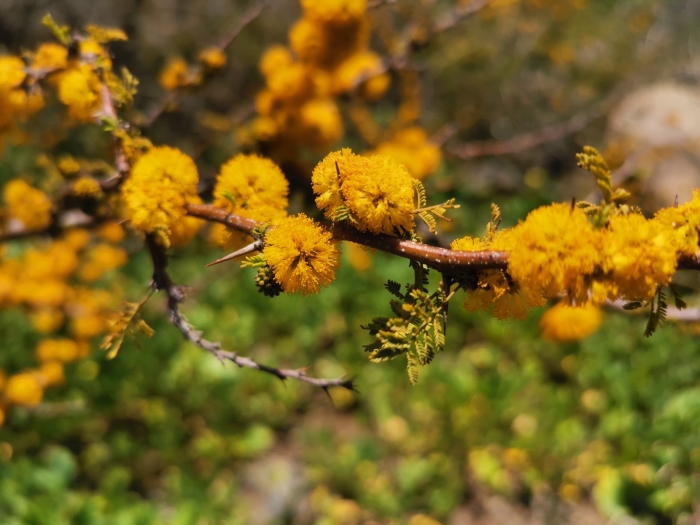Roman Cassie
(Vachellia caven)
Roman Cassie (Vachellia caven)
/
/

Inao Vasquez
CC BY 4.0
Image By:
Inao Vasquez
Recorded By:
Copyright:
CC BY 4.0
Copyright Notice:
Photo by: Inao Vasquez | License Type: CC BY 4.0 | License URL: http://creativecommons.org/licenses/by/4.0/ | Rights Holder: Inao Vasquez | Publisher: iNaturalist | Date Created: 2021-09-26T13:47:47-07:00 |


















































Estimated Native Range
Summary
Vachellia caven, commonly known as Roman Cassie, is an evergreen shrub or small tree native to the seasonally dry forests, savannas, and thorn scrub of South America, particularly in Argentina, Chile, Uruguay, and Brazil. It typically grows to a height of four to five meters and is notable for its very stiff and sharp white thorns that can reach up to 2 cm in length. Vachellia caven blooms in spring, producing bright yellow flower clusters that are 1–2 cm (0.39–0.79 in) in diameter, which are highly attractive to pollinators such as bees. The tree is also valued for its ornamental features, including its fragrant flowers and the contrast between its dark green foliage and white thorns.
Roman Cassie is appreciated for its drought tolerance and is often used for erosion control due to its deep root system. It thrives in full sun and requires minimal water once established, making it suitable for xeriscaping. It is well-adapted to soils with fast drainage and can tolerate poor soil conditions. In cultivation, it is used for its ornamental value in gardens and landscapes, and its thorns make it an effective barrier plant or informal hedge. Gardeners should be cautious when planting near pedestrian areas due to its sharp thorns. While it is generally disease-resistant, overwatering can lead to root rot.CC BY-SA 4.0
Roman Cassie is appreciated for its drought tolerance and is often used for erosion control due to its deep root system. It thrives in full sun and requires minimal water once established, making it suitable for xeriscaping. It is well-adapted to soils with fast drainage and can tolerate poor soil conditions. In cultivation, it is used for its ornamental value in gardens and landscapes, and its thorns make it an effective barrier plant or informal hedge. Gardeners should be cautious when planting near pedestrian areas due to its sharp thorns. While it is generally disease-resistant, overwatering can lead to root rot.CC BY-SA 4.0
Plant Description
- Plant Type: Shrub
- Height: 15-20 feet
- Width: 11-15 feet
- Growth Rate: Moderate
- Flower Color: Yellow
- Flowering Season: Spring
- Leaf Retention: Evergreen
Growth Requirements
- Sun: Full Sun
- Water: Low
- Drainage: Fast
Common Uses
Bird Garden, Low Maintenance, Showy Flowers
Natural Habitat
Seasonally dry forests, savannas, and thorn scrub of South America
Other Names
Common Names: Roman Cassie, Aromita, Aromo Criollo, Caven, Churque, Churqui, Espinillo, Espinillo De Baado, Espino, Espino Maulino, Espino Caván
Scientific Names: , Vachellia caven, Acacia caven, Acacia caven var. caven, Acacia caven var. dehiscens, Acacia caven var. stenocarpa, Acacia caven var. microcarpa, Acacia cavenia, Acacia caven var. sphaerocarpa, Acacia caven var. macrocarpa
GBIF Accepted Name: Vachellia caven (Molina) Seigler & Ebinger